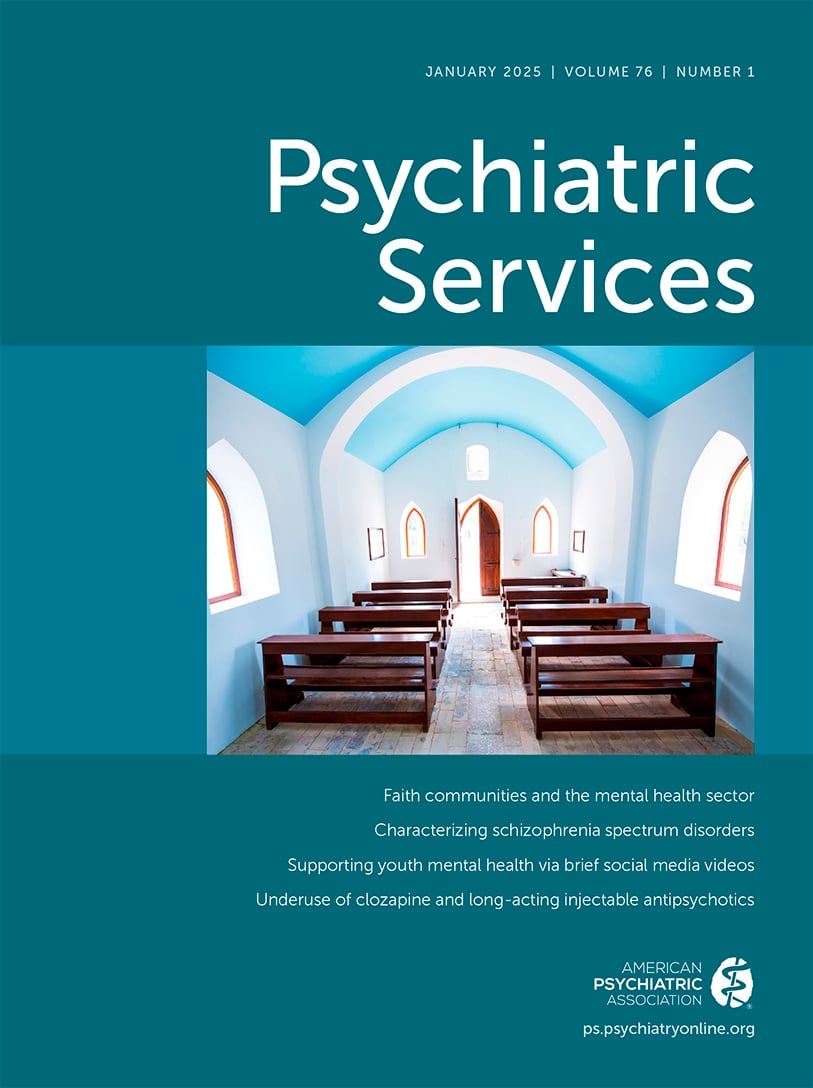Psychiatric Services
- Volume 47
- Number 9
- September 1996
Publication date: 01 September 1996
Pages951–955OBJECTIVE: The Omnibus Budget Reconciliation Act of 1987 (OBRA-87) included provisions for regulating the use of psychotropic medication, particularly antipsychotics, in long-term-care facilities. The study examined the effect of OBRA-87 on patterns of ...
https://doi.org/10.1176/ps.47.9.951Publication date: 01 September 1996
Pages956–960OBJECTIVE: The study determined the rate of incapacity to give informed consent for medical treatment among patients admitted to a nursing home and assessed whether clinical staff members recognized this incapacity and whether they used alternative means ...
https://doi.org/10.1176/ps.47.9.956Publication date: 01 September 1996
Pages961–965OBJECTIVE: To increase understanding of the needs of elderly patients with serious mental illness, the study analyzed and compared use of hospital-based services by geriatric patients with bipolar disorder and schizophrenia. METHODS: The sample consisted ...
https://doi.org/10.1176/ps.47.9.961Publication date: 01 September 1996
Pages966–970The concept of medical necessity has its roots in payers' fear that mental health care will be overused by those with access to it. The author argues that such a fear was reinforced by practice patterns that were dominant before the advent of managed care,...
https://doi.org/10.1176/ps.47.9.966Publication date: 01 September 1996
Pages971–974The author reviews the history of the development of managed care, the restrictions it has placed on psychiatric treatments, including psychotherapy, and the concerns it has raised about access to and quality of care. He discusses research studies ...
https://doi.org/10.1176/ps.47.9.971Publication date: 01 September 1996
Pages975–979OBJECTIVE: The study assessed the prevalence and duration of axis III physical disorders and the resulting level of disability among Southeast Asian refugee outpatients with axis I psychiatric disorders. METHODS: A total of 266 consecutive patients who ...
https://doi.org/10.1176/ps.47.9.975Publication date: 01 September 1996
Pages980–984OBJECTIVE: This study examined the relationships of substance abuse, use of community-based services, and symptom severity among rural and urban residents with schizophrenia in the six months after discharge from short-term inpatient care. METHODS: At ...
https://doi.org/10.1176/ps.47.9.980Publication date: 01 September 1996
Pages985–990OBJECTIVE: The study examined whether length of hospital stay is related to recidivism among psychiatric patients. A quasi-experimental approach was used to address limitations of controlled and epidemiological research. METHODS: Three matched groups, ...
https://doi.org/10.1176/ps.47.9.985Publication date: 01 September 1996
Pages991–993Three cases in which patients who were taking fluoxetine for relief of depression showed patterns of abnormal movements suggestive of tardive dyskinesia are presented. In the first case, abnormal facial movements began four weeks after fluoxetine was ...
https://doi.org/10.1176/ps.47.9.991Publication date: 01 September 1996
Pages993–995To better understand factors contributing to underutilization of mental health treatment services by Asian immigrants in English-speaking countries, the authors compared the pathways to treatment of 30 psychiatric patients born in Indochina who currently ...
https://doi.org/10.1176/ps.47.9.993Publication date: 01 September 1996
Pages996–998The impact of reducing length of stay on readmission rates was examined for privately insured patients treated on a traditional inpatient unit or in an alternatives program with a shorter stay and a continuum of acute care. Billing data were analyzed for ...
https://doi.org/10.1176/ps.47.9.996Publication date: 01 September 1996
Pages998–1000Psychiatrists providing emergency services at an urban general hospital completed questionnaires on 227 patients evaluated over a two-month period to assess whether they suspected the patient of malingering or of having secondary gains, and whether the ...
https://doi.org/10.1176/ps.47.9.998Article
Article
Article
Article
Past Issues
View Issues Archive
Vol. 76 | No. 1

Vol. 75 | No. 12

Vol. 75 | No. 11
